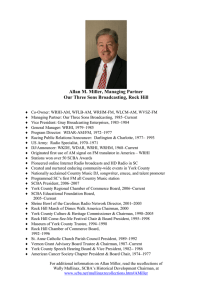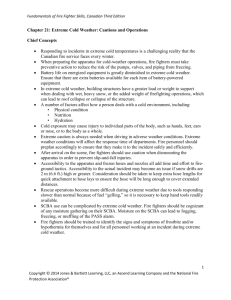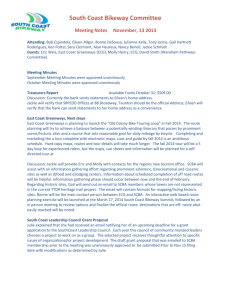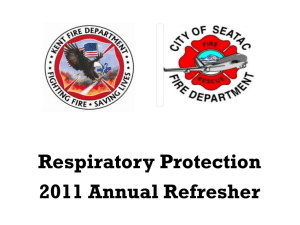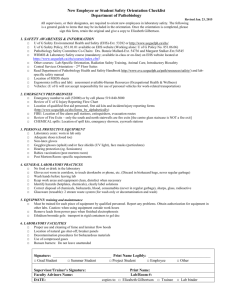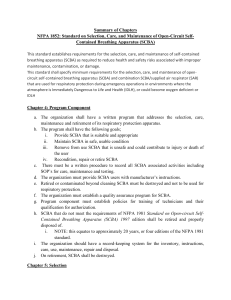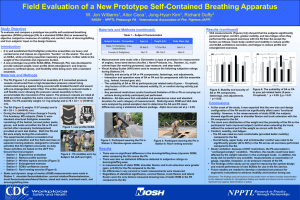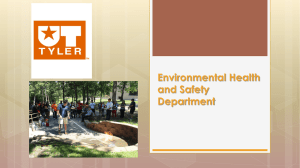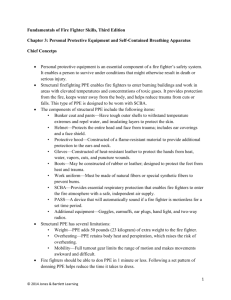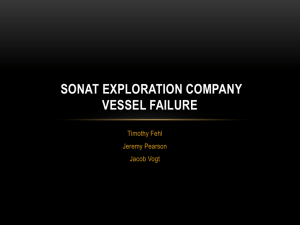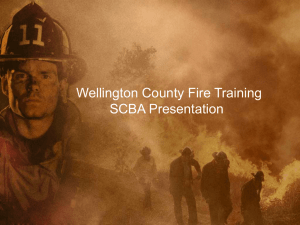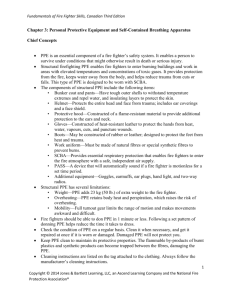JO EHS Bulletin AUG 2010 No. of Recordable Injuries since 2003
advertisement
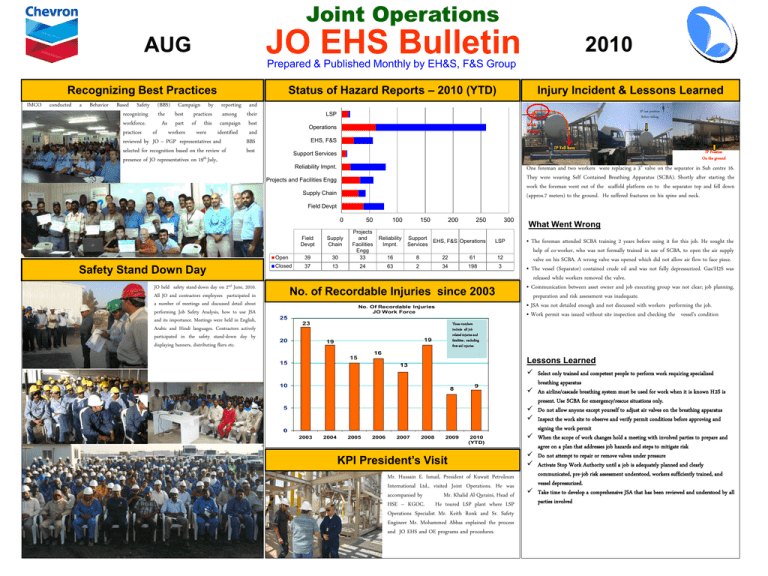
Joint Operations JO EHS Bulletin AUG 2010 Prepared & Published Monthly by EH&S, F&S Group Status of Hazard Reports – 2010 (YTD) Recognizing Best Practices IMCO conducted a Behavior Based Safety (BBS) Campaign by reporting recognizing the best practices 2009 among workforce. As part of this campaign practices of workers were identified reviewed by JO – PGP representatives and Adviser. Some of the employees were selected for recognition based on the review of practices. Awards were distributed in presence of JO representatives on 19th July, and their best and BBS best Injury Incident & Lessons Learned IP last position Before falling LSP Work Platform Operations EHS, F&S IP Fell here Support Services IP Position On the ground One foreman and two workers were replacing a 3” valve on the separator in Sub centre 16. They were wearing Self Contained Breathing Apparatus (SCBA). Shortly after starting the work the foreman went out of the scaffold platform on to the separator top and fell down (approx.7 meters) to the ground. He suffered fractures on his spine and neck. Reliability Impnt. Projects and Facilities Engg Supply Chain Field Devpt 0 Safety Stand Down Day JO held safety stand-down day on 2nd June, 2010. All JO and contractors employees participated in a number of meetings and discussed detail about performing Job Safety Analysis, how to use JSA and its importance. Meetings were held in English, Arabic and Hindi languages. Contractors actively participated in the safety stand-down day by displaying banners, distributing fliers etc. 50 Field Devpt Supply Chain Open 39 30 Projects and Facilities Engg 33 Closed 37 13 24 100 Reliability Impnt. 150 200 250 Support EHS, F&S Operations Services 300 LSP 16 8 22 61 12 63 2 34 198 3 No. of Recordable Injuries since 2003 No. Of Recordable Injuries JO Work Force 25 23 20 • The foreman attended SCBA training 2 years before using it for this job. He sought the help of co-worker, who was not formally trained in use of SCBA, to open the air supply valve on his SCBA. A wrong valve was opened which did not allow air flow to face piece. • The vessel (Separator) contained crude oil and was not fully depressurized. Gas/H2S was released while workers removed the valve. • Communication between asset owner and job executing group was not clear; job planning, preparation and risk assessment was inadequate. • JSA was not detailed enough and not discussed with workers performing the job. • Work permit was issued without site inspection and checking the vessel’s condition These numbers include all job related injuries and fatalities , excluding first aid injuries 19 19 What Went Wrong 16 15 15 Lessons Learned 13 10 8 9 5 0 2003 2004 2005 2006 2007 2008 2009 2010 (YTD) KPI President’s Visit Mr. Hussain E. Ismail, President of Kuwait Petroleum International Ltd., visited Joint Operations. He was accompanied by Mr. Khalid Al-Quraini, Head of HSE – KGOC. He toured LSP plant where LSP Operations Specialist Mr. Keith Ronk and Sr. Safety Engineer Mr. Mohammed Abbas explained the process and JO EHS and OE programs and procedures. Select only trained and competent people to perform work requiring specialized breathing apparatus An airline/cascade breathing system must be used for work when it is known H2S is present. Use SCBA for emergency/rescue situations only. Do not allow anyone except yourself to adjust air valves on the breathing apparatus Inspect the work site to observe and verify permit conditions before approving and signing the work permit When the scope of work changes hold a meeting with involved parties to prepare and agree on a plan that addresses job hazards and steps to mitigate risk Do not attempt to repair or remove valves under pressure Activate Stop Work Authority until a job is adequately planned and clearly communicated, pre-job risk assessment understood, workers sufficiently trained, and vessel depressurized. Take time to develop a comprehensive JSA that has been reviewed and understood by all parties involved
